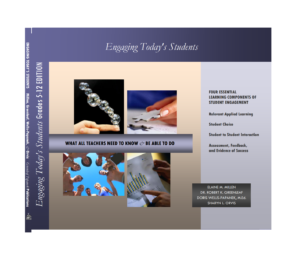What All Teachers Need to Know & Be Able to Do
Four Essential Learning Components of Student Engagement.
In this book, we have examined the research around grades 5-12 learners of today, the brain sciences (with respect to learning), and effective teaching practices that link to long-term memory and recall. We have observed hundreds of classroom lessons and activities, developed by an array of practicing school teachers. A strong indicator for how we organized this book was our deep commitment to learners ~ students as learners AND faculty as learners ~ and how we all can learn in significant ways that are also sustainable.
Applied Learning
Work and learning are particularly vulnerable to a powerful condition of disengagement. Any theory or concept must have relevance for the learner through their experiences or a connection to current events.
Student Choice
When students have control of their educational experiences their ability to learn and retain the material increases. Teachers must serve as facilitators, rather than as directors of the learning.
Student to Student Interaction
Social relationships are at the essence of life ~ and important to the learner’s depth of acquired knowledge. Connections to other disciplines and the extension of information are enhanced through social interaction processes. Intermittent opportunities for learners to interact can reestablish efficient processing functions.
Assessment, Feedback, & Evidence of Success
The reasons for assessment eclipse traditional scoring or grading purposes. Assessment is not merely testing or the giving of a quiz here or there. Its greatest value is in the feedback it provides to both the learner and to the instructor. Intermittent feedback on key learning outcomes that learners will “know and be able to do” as a result of the course is essential for processing toward the creation of long-term memory.

“… today’s teachers need to know and be able to do things their predecessors did not. They have to be prepared to educate all of their students to achieve the highest learning outcomes in history. This is a fundamentally different job than [before].” Arthur Levine, 2006.